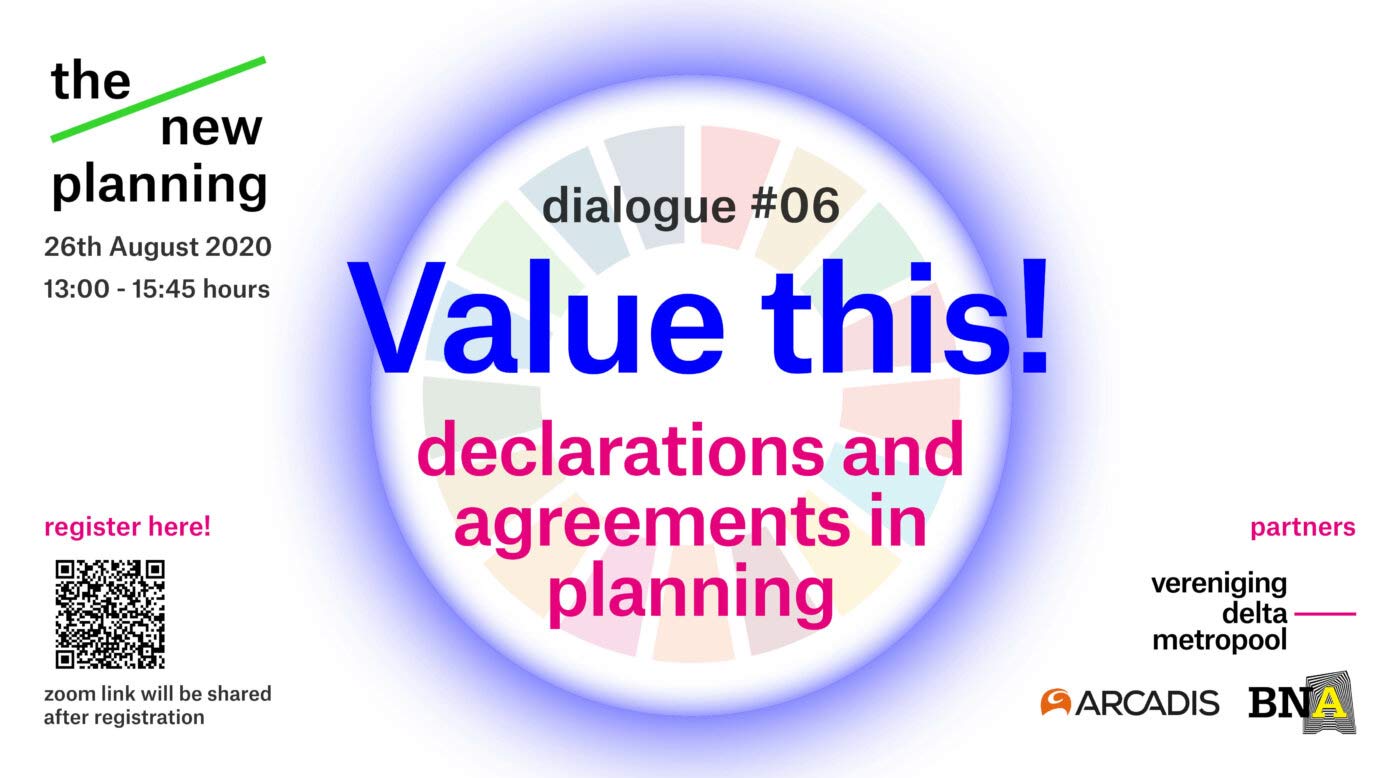Value this!
Declarations and Agreements in Planning
'VALUE THIS!' is a master class as part of the 'The New Planning Dialogue' organized by Vereniging Deltametropool in collaboration with BNA International and Arcadis. We take the opportunity of a digital set up to look at global agreements and their growing importance guiding planning systems as well as project implementation. Also, to discuss the role of values in planning with some examples from practice.
– Register here for the joining link
(The registration and the joining link will be sent via email at 11:00 hours on Wednesday, 26th August)
The New Planning dialogue always supported the international discussion, setting out the urgencies and positioning the Netherlands in the international context. This is the sixth event of The New Planning Dialogue, in the series of eight inspiring activities focusing on the role and purpose of values in planning.
Role of Agreements, Declarations and Agendas in Planning
In recent times a lot of focus is being shown towards the global agreements. In somewhatay, these are providing a direction for planning systems in different countries. But what is the definitive role of these agreements and declarations? How much are they important and relevant under the pressurized challenges and uncertainties? How these can be a response to the urgencies of the Dutch spatial planning agenda? How does the environmental, societal and technological changes lead to alternative instruments or components of a planning model, vision-making, collaboration, decision-making, networks and knowledge dissemination? Some of the examples that will be looked at will be;
– 2030 Agenda for Sustainable Development, at its heart are the 17 Sustainable Development Goals (SDGs), which are an urgent call for action by all countries in a global partnership.
– Davos Declaration 2018, politically and strategically promoting the concept of a high-quality Baukultur in Europe.
– Paris Agreement 2015 , first-ever universal, legally binding global climate change agreement.
– Climate Agreement Netherlands 2019 , is a collaboration between central government, the decentralized authorities, the business community and social organizations.
– New Urban Agenda 2016 – UN Habitat, is an action-oriented document that mobilizes key stakeholders to drive sustainable urban development at the local level.
– European Green Deal 2020, is our roadmap for making the EU’s economy sustainable.
Values in planning practice
When sharing values, people move in the same direction while doing their own thing. Values help us navigate the complex landscapes that are today’s cities. Values drive motivation and collaboration, representing concepts people consciously or unconsciously share. Values function in clusters and they represent concepts that people know consciously or unconsciously.
What are the values in planning? How are they relevant in New Planning discussion?
Role of Planners addressing these agreements and values
What societal, environment and economic values can we add practicing planning? What are the role of designers and planners addressing these agreements and declarations? How does the subject of sustainability fit-in in the current pandemic context? Does this change our goals of way of working? Is there a need to re-focus or we take this as an opportunity to implement the ideas of sustainability? What has already been done? What can we do further? What are the missing links?
Tentative Program
12:45 – Meet and greet
13:00 – Welcome and introduction by Alankrita Sarkar (Deltametropolis Association)
Part 1: Role and purpose of international agreements and declarations in planning
13:10 – Declarations and values in building culture in Netherlands. Conversation with:
Flip ten Cate ( Federation for Spatial Quality)
Caroline Nevejan (University of Amsterdam )
Paul Gerretsen (Deltametropolis Association)
Part 2: Values in planning agreements and declarations
13:50 – Values in sustainable design and planning. Conversation between:
Martina Huijsmans (Wethouder, city of Delft)
Marcia van der Vlugt (Ministry of Interior and Kingdom Relations)
Paul Gerretsen (Deltametropolis Association)
1 4:30 – Coffee break
Part 3: Approaches towards planning with agreements and declarations
14:40 – Sustainable approaches from public-private collaboration by Mark Binnenpoorte and Niels Driessen (Arcadis Nederland)
14:55 – Sustainable toolbox by Séverine Hermand (Be Sustainable Brussels)
Part 4: Reflecting back
15:10 – Breakout rooms
– Room 1: moderated by Alankrita Sarkar, in dialogue with Mark Binnenpoorte, Niels Driessen and Marcia van der Vlugt
– Room 2: moderated by Mathias Lehner, in dialogue with Séverine Hermand and Flip ten Cate
– Room 3: moderated by Paul Gerretsen, in dialogue with Martina Huijsmans and Caroline Nevejan
15:40 – How to put it in practice? Conclusions with Mathias Lehner (BNA international)
15:55 – Thank you borrel (Alankrita Sarkar)
Register for the event!
We cordially invite you to participate in this masterclass to discuss about the values in planning and join the sixth New planning Dialogue.
Register before 12:00 hours on 24th August 2020 . You will be provided with the relevant links to join the session after registration. Visit our website for more information regarding the project.
Pay as you like!
Remember that Vereniging Deltametropool is a non-profit association of which you can become a member. This event is organized without a fee, but you can pay as you like through: this link or by using this QR code:

The New Planning dialogue
This is the sixth event of The New Planning Dialogue, in the series of eight inspiring activities in the upcoming years. We are looking forward to host all the partners of The New Planning at this event. You can read more about the previous events over here .
Next event: Role of Planning and Role of Planners
Repositioning the spatial planner/designer as an orchestrator and enabler of sustainable regional futures. With the current pressing global issues in mind, it is high time to embrace and promote the unique qualities and attributes of spatial planning and design, and explore the new roles for planners/designers. What should they serve in addressing the big-ticket issues of the 21st century? What capacities are essential to interact with new planning related sectors to encompass distinctive collaborations?
Visit the activity page for more information.
